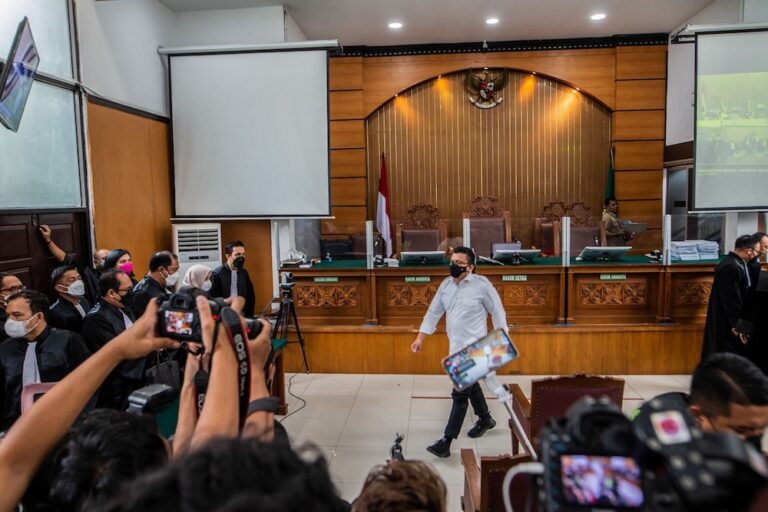"Tempo" magazine published images of a police officer with piggy banks to accompany an article titled "Fat bank accounts of police officers".
(AJI/IFEX) – The Alliance of Independent Journalists (AJI) wants the Indonesian Police Headquarters to withdraw criminal charges against “Tempo” magazine. AJI strongly suggests that the Indonesian Police Headquarters should instead pursue procedures stipulated in Press Law no. 40/1999, which is to exercise their right to reply or file a complaint with the Press Council. “The filing of criminal charges against “Tempo” implies that the police disrespect the Press Law,” said Nezar Patria, president of AJI Indonesia.
The Indonesian Police Headquarters filed criminal defamation charges against “Tempo” with the Police Criminal Unit – an institution under the National Police itself. This lawsuit was triggered by the cover story of an issue of “Tempo” entitled “Fat Bank Accounts of Police Officers”. The magazine’s cover featured an illustration showing a brown-uniformed policeman with piggy banks. The head of the National Police was infuriated by the piggy bank image – a degradation to policemen, he said.
“This illustration does not fall under defamation because it can be interpreted as the police carrying out their duty to investigate dubious accounts,” Nezar Patria argued.
Nezar added that the cover of “Tempo” news magazine constitutes an artwork. “It can stand by itself as a distinct work of art, while at the same time providing illustrative context to a journalistic work.” Following this line of argument, a magazine cover can be understood separately from the news report. “It is like the cover illustration on a book, novel or short story illustration on newspaper,” explained Nezar.
Moreover, AJI is concerned that the police are using Articles 207 and 208 of the Indonesian Criminal Code. These articles cover criminal defamation; filing of criminal defamation charges is a classic measure to muzzle the press. Criminal defamation laws are like the infamous “rubber articles”, a legacy from the Dutch colonial era, which should be revoked by an independent and democratic nation such as Indonesia. “It is a shame that the police are using tools of colonial-era repression to silence ‘Tempo’,” said Margiyono, advocacy coordinator at AJI Indonesia.
AJI Indonesia is worried that the charges filed by the police, now in the hands of the Police Criminal Unit, constitute a conflict of interest. “No one can be sure that the Police Criminal Unit will remain impartial in handling cases filed by its own superior officers,” Margiyono explained.
The “Tempo” cover story should be used by the National Police to enhance its professionalism and uphold the law objectively. Police should avoid “killing the messenger.”
AJI Indonesia concludes that the filing of criminal charges against “Tempo” is evidence of the lack of seriousness in reforming the police. Rather than filing a complaint, the head of the National Police should do its best to investigate the alleged illegal accounts of its own high-ranking officials. This way, the police can maintain their good image through active and responsive measures to uphold clean governance, as mandated by Indonesia’s reform movement and its constitution.


